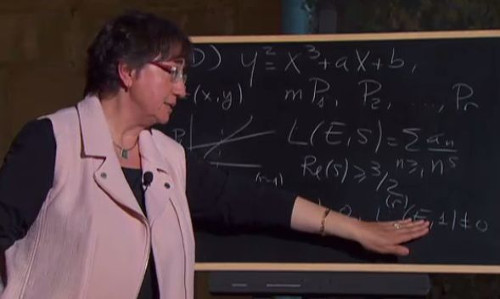Pilar Bayer, full academician of the Royal European Academy of Doctors-Barcelona 1914 (RAED) and emeritus professor of the University of Barcelona, has participated as a guest lecturer at the School of Mathematics of Berlin (BMS), which held between the past 21 and February 23 the 6th “BMS Student Conference” in the German capital. The cycle was developed in the Hall of the Institute of Computer Science of the Free University of Berlin. The BMS is a mathematics school dedicated specifically to the training of graduate students in the period of realisation of the doctoral thesis and it is shared by the three public universities of the capital, the Humboldt University of Berlin, the Technical University of Berlin and the Free University of Berlin.
 Bayer gave the talk “Complex uniformization of Fermat curves”, in which she presented a join work with Jordi Guàrdia, a professor at the Polytechnic University of Catalonia. The study combines classic and modern techniques with a strong programming and computational component. Although the origins of the theoretical problem of the uniformization of curves can be traced back to the work of Felix Klein (1883), Henri Poincaré (1907) and Paul Koebe (1907), only for few algebraic curves an explicit uniformization is known. These are, basically, the circle, the elliptic curves and the modular curves.
Bayer gave the talk “Complex uniformization of Fermat curves”, in which she presented a join work with Jordi Guàrdia, a professor at the Polytechnic University of Catalonia. The study combines classic and modern techniques with a strong programming and computational component. Although the origins of the theoretical problem of the uniformization of curves can be traced back to the work of Felix Klein (1883), Henri Poincaré (1907) and Paul Koebe (1907), only for few algebraic curves an explicit uniformization is known. These are, basically, the circle, the elliptic curves and the modular curves.
In the paper an explicit uniformization of the Fermat curves of exponent N, F(N), was presented, based on an identification of their symmetries by specific groups of movements of the hyperbolic geometric plane. In this way, for each exponent N, functions, that the authors designate as Fermat’s sinus and Fermat’s cosinus and that parameterize the F(N) curves, are determined. In the case N = 2, the sinus and cosinus of classical trigonometry are recovered, since F(2) is the circle. As a curiosity, each curve F(N) gives rise a transcendental number pi(N), which depends on N, and such that for N = 2 is the usual pi number.

